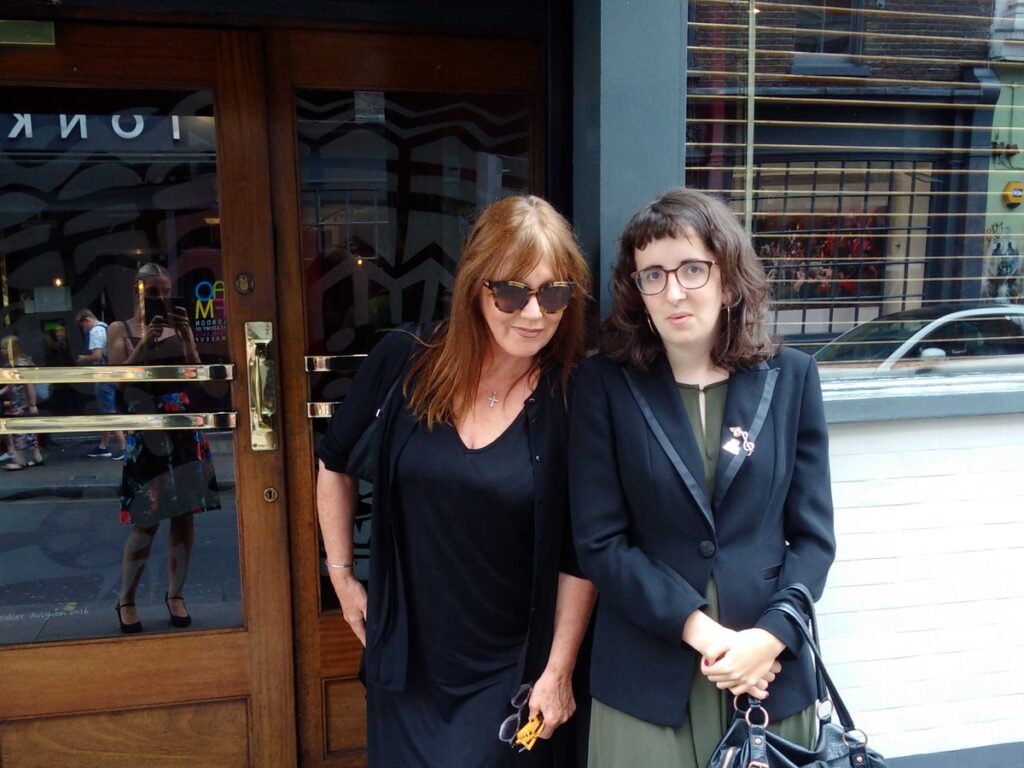We talk useful financial/career resources for journalists, industry barriers and the difficulties of managing money as a freelancer
For this week’s How I Make It Work, Creative Money spoke to Lydia Wilkins. A freelance journalist, Wilkins [pictured above, right] has had bylines at a string of significant publications, including The Independent, The Metro and Readers Digest. Wilkins also writes her own blog, Mademoiselle Women (in which she documents life on the Autistic spectrum) and pens an excellent weekly newsletter. She is currently busy developing these into sources of income.
Like many of us, Wilkins is in the process of attempting to weave these various creative threads together in order to form a viable freelance career and support herself through her writing.
We spoke via email about the resources that have helped her figure it out thus far, what she’d change about the treatment of freelancers and how she goes about keeping track of her finances, despite her struggles with numbers.
How would you describe your current role?
“I’m a multi-hyphenate freelancer! I blog three times a week at mademoisellewomen.com. I contribute regular freelance articles to places like The Independent, Readers Digest, Refinery 29 and The Overtake – usually to do with travel, book, or autism. I’m also a webinar trainer for a small organisation that teaches strategies about Autism. I also run a weekly newsletter; this has interviews, a comic I’ve been able to commission, as well as resources for freelancers and Autistic individuals.”
“It’s insulting to ask me to do whatever for ‘exposure’. Exposure isn’t a tangible concept – it doesn’t pay my bills”

Do you ever do unpaid work? What are your thoughts on this?
“Very, very occasionally. Right now, the blog is not profitable – despite ‘breaking even’ last year – due to the pandemic. Sometimes smaller magazines that cannot afford to pay allow you to pursue a story you wouldn’t have been able to take up elsewhere. I recently interviewed Lissie for BN1 Magazine – everywhere I pitched had quite specific rejections, she did not ostensibly fit the ‘brand’, etc. I got to interview her down the phone – and it’s still one of my favourite interviews I’ve conducted.
“That being said, I don’t think it should be allowed. Freelancers are highly qualified individuals. They are just as valuable as staff reporters – you should be paying for the service you use. I sometimes feel like freelance contracts have just been used to pay less, to still create a quality product – but we need time and resources… it’s insulting to ask me to do whatever for “exposure”. Exposure isn’t a tangible concept – it doesn’t pay my bills – so why would I agree to that?”
Want to make sure you never miss a post?
Sign up to the Creative Money newsletter!
Let me read it first >
What decisions or experiences have proved most valuable in helping you to establish yourself within the industry?
“Firstly, I have been invited to events that Hacked Off have held. While the issue of press regulation is still controversial, it was utterly harrowing to hear the stories of people who’d been harassed, placed under surveillance, etc. Journalism has a responsibility; we are the gate-keepers, but we cannot behave in such a way to people, regardless of fame or fortune. I have this at the forefront of my mind most days – and it informs the way I talk to sources.
“Secondly, ‘If you don’t ask, you don’t get’ is a phrase I grew up with. Derren Brown wrote of changing our stories, the stories we tell ourselves [essentially, making the choice to reframe the way we view ourselves and our limitations] – and doing that can work really well.”
What have you found to be the best resources in terms of figuring out how to earn money and sustain yourself as a journalist?
“Journo Resources was the first website I came across, while studying, that I thought ‘they get it’. As an Autistic individual, I have often had to battle to be heard – and not just be taken as someone who ‘suffers’. (Yep, this has been said to me on several occasions – and is a disgusting trope. It also can prevent me doing the job I do.) There is a wealth of resources, and I learnt a lot more than I thought I would – with CVs, how to invoice, and more.
“The Bloglancer is run by journalist Jenna Farmer. It’s a blog about how to make money blogging, as well as freelance journalism. Here was someone experiencing the same I was – who was maybe just that little bit older, and a little bit wiser! The posts are accessible, cover a slew of issues, and I have gotten some work from the fortnightly jobs board.
“PressPad is an organisation that is devoted to #DiversifyTheMedia. I wish they’d been around when I was starting to get interested in journalism! The pandemic means they’re running a great outreach programme – with masterclasses, CV clinics, and more.”

Have you had any good financial role models?
“Not really, no…”
How do you attempt to deal with the inevitable ups and downs in cash flow that come with freelancing?
“I must admit, I am not really sure how to answer this one…”
Struggling with your cash flow as a freelancer? Take a look at our guide: ‘How to manage your money on a variable income’
Do you find that you have to keep a close eye on your finances? What tools and resources help you to do so?
“Yes. My support worker has suggested I may have a condition that affects my ability to interpret numbers – it’s something I really struggle with. I use a form of journaling, month by month, to keep a track of my finances – such as with ongoing invoices, and keeping a visual record of my financial history. Bullet journaling can help.”
Are you saving for retirement? Is this something you feel is feasible?
“Not just yet! I am looking to get into full-time employment. Though I am a trained reporter – and have interviewed people like Anastacia, Sir Harold Evans, Jodi Picoult – I have often found myself on the end of discrimination. I am slowly transitioning; then I will save for retirement.”
“I use a form of journaling, month by month, to keep track of my finances”

Is there anything that bugs you about the way the industry operates, particularly in terms of finances or money management, that you would like to change for the better?
“What bothers me is the way freelancers are treated. You are supposed to be paid within 30 days – and late payments can apply. This is the law, yet so many publications willingly flout this! Apparently, it takes 45 days to get set up on one finance system, I was told for one publication. And I think I also had to follow up that payment… Freelancers are becoming more and more used, across more and more industries. It’s about time they were treated fairly – with pay that’s in line with a staff job, equal across all characteristics – and not just as an afterthought.”
Have you noticed any issues relating to finance that might prove a barrier to diversity in the industry? And do you have any ideas for improving the situation?
“I’m not sure I have any practical solutions. It’s a really good question to be asking, but it is not always to do with hiring, but more about [what we can do] at an educational level. For journalism, if your parents are university educated and were reporters – plus, being male and white with your own degree – it gives you a hell of an advantage… I wouldn’t know what to say to that – but I wrote about it here.”
What’s the most valuable advice you can offer to someone starting out in the industry?
“One of my mentors worked for Reuters, and is sometimes looked-up to as a kind of ethics authority. I asked for him, and I remember the most valuable piece of advice he gave me: ‘at the end of the day, you only have yourself to answer to.’ Regardless of having to pay your bills, keep to deadlines, as long as you are okay with what you’re doing – if it ‘sits right’ – then that’s okay.’”

The summary:
- If you’re going to write for free, write for yourself. The much-vaunted ‘exposure’ offered by non-paying platforms is rarely worth it. Spend the time building your own audience.
- Change the stories you tell yourself. Do you avoid pitching opportunities for fear of rejection? This can be a self-perpetuating cycle: fearing failure means we don’t try, which results in guaranteed failure. Instead, try telling yourself ‘I need to give it a go to find out if this works…’
- Find resources that demystify your industry. There are some excellent resources emerging for the world of freelance journalism and writing. Check out Journo Resources, Press Pad and The Bloglancer.
- Try bullet journaling to get a visual representation of what’s happening with your finances, month-to-month. If you struggle with numbers, bullet journaling can give you a more ‘hands-on’ sense of your cash flow. Here are some ideas on that.
- Journalism is still dominated by white males with degrees. Diversifying access to education and training is key to addressing this imbalance.
Support Lydia Wilkins’ work!
- Follow Lydia Wilkins on Twitter
- Subscribe to Lydia’s newsletter
- Read Lydia’s blog MademoiselleWomen.com
How can we help you?
What issues are you facing? What questions do you have about managing your money in the creative industries? What would be most helpful to you?
We don’t have all the answers, but maybe we can find someone that does.
Send your questions and suggestions to creativemoneycontact@gmail.com.
We want to hear from you.
How I Make It Work is a series of interviews with a variety of creative professionals, where we discuss personal experiences and lessons learned about money in the creative industries.
